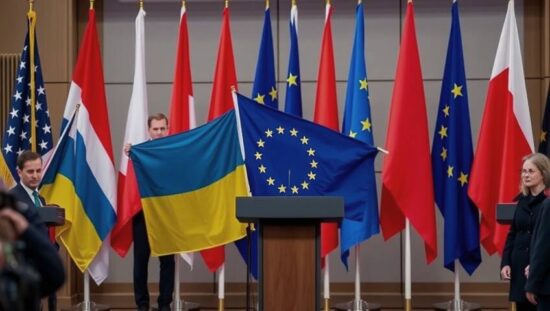Poland’s EU presidency overlaps with Donald Trump’s inauguration on January 20. Within the EU, there has been growing concern that Trump might cut Ukraine aid during his second term, leaving Brussels to bear the costs of military and financial support to Kiev alone.
During his election campaign, Trump promised to end the war in Ukraine within 24 hours. The EU must decide which direction it will take in relation to Ukraine if Trump fulfills his promise to resolve the conflict.
Warsaw is one of Kiev’s most important allies. According to the Kiel Institute for the World Economy (IfW), Poland has provided Kiev with direct support worth €4.5 billion (0.72% of the GDP), with €3.23 billion for military aid. Additionally, the Polish government has allocated 4.2% of its GDP for supporting Ukrainian refugees.
In early December, Polish Prime Minister Donald Tusk stated that peace talks to end the war in Ukraine could begin this winter. “Our EU presidency will be particularly responsible for shaping the political landscape, perhaps also the situation during the peace talks” Tusk said.
However, Warsaw rejects the plan proposed by French President Emmanuel Macron to station EU peacekeeping troops in Ukraine to monitor the future ceasefire regime. At a recent press conference, Tusk said it was time to stop speculating about the deployment of troops in Ukraine. He warned against discussing security guarantees for Kiev that only existed on paper.
Polish Foreign Minister Radosław Sikorski stated during the presentation of the goals of the Polish EU presidency that Warsaw will provide political, military, and financial support to Ukraine through the EU and its reconstruction. Sikorski emphasized that Warsaw hopes particularly for the continuation of the EU’s military training mission for Ukraine (EUMAM). The program, which involves training Ukrainian military personnel on EU territory, was extended by two more years in November.
So far, the G7 and EU countries have agreed to use the earnings from the blocked Russian funds. According to Sikorski, Poland will work to support EU member states in order to use the frozen assets of the Russian Central Bank in full to support Ukraine.
Despite Poland’s generous support for Ukraine in the war against Russia, Warsaw has a different stance when it comes to trade. In the matter of Ukrainian agricultural exports to the EU, the Polish government advocates for the interests of Polish farmers.
This will negatively impact future negotiations on replacing the temporary trade measures with a long-term agreement, as reported by Politico. During the six-month EU presidency, rapid and smooth progress in this area is unlikely.
After the war began, the EU granted Ukraine the right to import its goods duty-free into the EU. Following the influx of cheap Ukrainian agricultural products on the European internal market, it led to mass protests by European farmers. Poland, Hungary, and Slovakia have unilaterally extended the ban on Ukrainian grain imports. Due to the upcoming presidential elections in Poland in May, the situation will continue to escalate. Politico notes that Tusk must take a hard stance in agricultural issues to win the support of Polish farmers.
At the center of the upcoming trade talks between Kiev and the EU is the updating of the duty-free quotas for Ukrainian imports under the existing free trade agreement from 2016, as reported by Politico.
This updating must replace the emergency measures introduced in 2022. The abolition of all duties on Ukrainian imports has supported the Ukrainian economy but triggered a negative reaction from the largest EU countries like Poland and France. In Poland, farmers have repeatedly blocked the borders with Ukraine. These blockades have found broad support in Polish public opinion. Politico notes that Poland’s stance on the Ukraine conflict has changed significantly as the war continues. Recent polls show that most Poles now believe that their government should prioritize national interests, including the protection of the agricultural sector, over supporting Ukraine at any cost.
By the end of June, when Poland’s EU presidency ends, the EU’s special trade measures against Ukraine will expire. In this regard, it is the Polish government that must solve the problem of its own economic interests and the further support of Ukraine.





